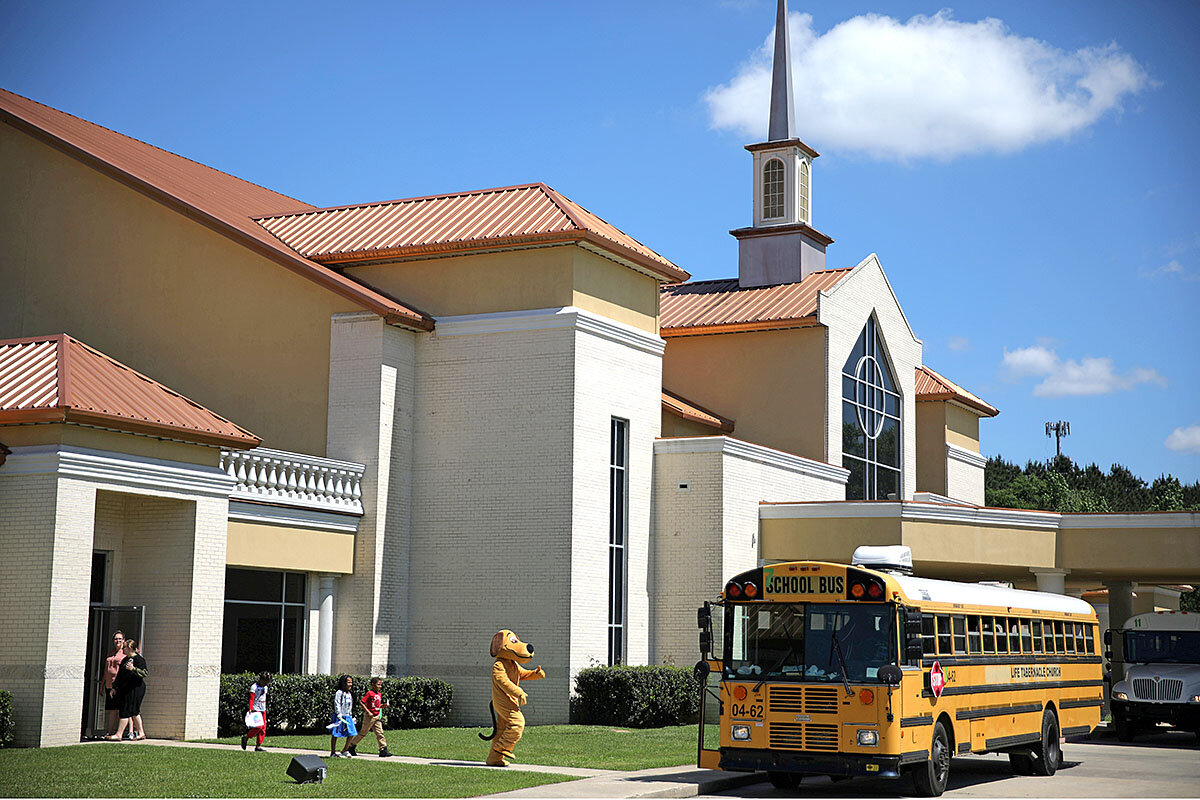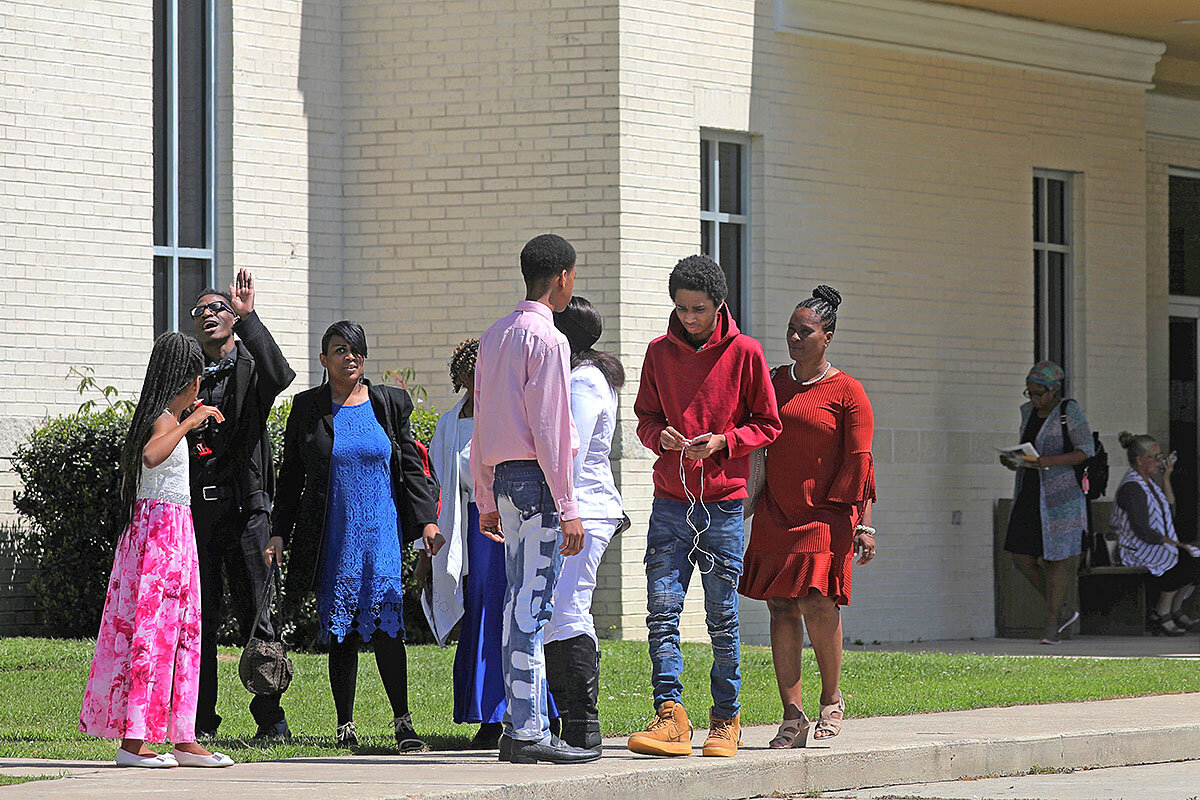Prayer services during a pandemic: Why some churches stay open
Loading...
| New York
Rusty Reno has been a bit alarmed over the past few weeks as both civil and religious authorities began to restrict the number of people who can gather together to pray.
The Catholic theologian and conservative political thinker bristled when the New York archdiocese shut down most services over three weeks ago in response to the coronavirus crisis ‚Äď even though Democratic Gov. Andrew Cuomo‚Äôs executive order that houses of worship were not ordered closed.¬†
‚ÄúI mean, right now I‚Äôm looking out of my window at the construction project on a very tall apartment building, and it‚Äôs ongoing,‚ÄĚ says Mr. Reno, editor of , a Manhattan-based journal published by the Institute on Religion and Public Life. ‚ÄúSo the trades in New York got an exemption for construction projects, the liquor stores are deemed essential services, the hookah stores are deemed essential services,‚ÄĚ he says.
Why We Wrote This
If liquor stores and smoke shops are considered ‚Äúessential,‚ÄĚ why not religious services? That‚Äôs the question a number of conservative religious groups are asking in the wake of the nearly nationwide shutdown sparked by the coronavirus crisis.
‚ÄúSo I still wish that the churches, the leaders of the church, had pressed for reasonable accommodations,‚ÄĚ continues Mr. Reno. Their concern, especially now, should be to sustain the spiritual health of those entrusted to their care, he says.
Editor’s note: As a public service, we’ve removed the paywall for all our coronavirus coverage. It’s free.
It‚Äôs been a refrain among a number of religious conservatives during the current contagion, but last week, after President Donald Trump warned Americans that ‚Äúhard days lie ahead‚ÄĚ and his administration issued sobering projections of COVID-19‚Äôs impact, the nation‚Äôs stay-at-home landscape began to change in unexpected ways.¬†
Last Monday, the sheriff in Tampa, Florida, of an Evangelical Protestant megachurch, charging him with unlawful assembly and violating the county’s emergency public health rules. On Wednesday, police in Lakewood, New Jersey, for a Hasidic rabbi, charging 15 people with violating Democratic Gov. Phil Murphy’s executive order banning large gatherings.
‚ÄúThis ban applies to everyone,‚ÄĚ said Ocean County Prosecutor Bradley Billhimer . ‚ÄúTo be blunt, ignoring the Governor‚Äôs Order places lives at risk ‚Äď not just the lives of everyday citizens, but the lives of our brave men and women in law enforcement who are required to respond in order to break up these unlawful gatherings.‚ÄĚ
As more states began to issue versions of stay-at-home orders, responding to President Trump‚Äôs warning that the country would have ‚Äúa rough two weeks‚ÄĚ ahead, many have listed places of worship as essential services exempt from bans on public gatherings.¬†
In Florida, Republican Gov. Ron DeSantis issued a new statewide order that listed ‚Äúessential activities‚ÄĚ including religious services, in effect superseding the local health rules behind the arrest of the Tampa pastor.¬† ¬†
Last week, , , and issued executive orders that include places of worship as essential services.¬†, too, exempts places of religious worship from penalty,¬†and exempts activities necessary to ‚Äúpreserve constitutional or legal rights,‚ÄĚ including to ‚Äúperform or attend religious or faith-based services or activities‚ÄĚ and ‚Äúmanufacture or sell firearms.‚ÄĚ
‚ÄúFew of the public health measures put in place around the country hit as close to home for people of faith as restrictions on when and how congregations can gather,‚ÄĚ says Dallas attorney Brad Nitschke, a partner with Jackson Walker. ‚ÄúAnd the tension between the First Amendment‚Äôs protection of the free exercise of religion and recommendations of public health authorities is clearly top of mind for elected officials, as well.‚Ä̬†¬†
The vast majority of the nation’s houses of worship, including most Catholic dioceses and Evangelical Protestant congregations, have already stopped meeting in person, according to a by the American Enterprise Institute. Still, about 12% of Americans who attend a church, temple, synagogue, or mosque say their congregations still continue to meet as before. 
Public health officials, including the federal Centers for Disease Control and Prevention, have urged communities of all kinds to avoid gathering in groups, in an effort to stem the spread of COVID-19 and alleviate the strain on the health care system.
Some of these congregations have downplayed such warnings, and many maintain a skepticism toward secular science and a deep suspicion of the encroaching power of government regulations. Some, too, express confidence in divine protection from what could be a moment of reckoning for the country. 
‚ÄúWe‚Äôve got to understand when God is in control of our life, then we can rest in the fact that we know that God,‚ÄĚ said Pastor Darlene Bishop Driscoll during her at Solid Rock Church in Monroe, Ohio, a multiservice megachurch that has continued to meet. ‚ÄúOK, so they call us stupid. That‚Äôs OK.‚ÄĚ
Later in the sermon she claimed the pandemic, in which 1.3 million people worldwide have been diagnosed, is God punishing the U.S. for legalizing abortion in the 1970s.
Earlier in the week a local health commissioner noting the complaints from those in the surrounding community, many worried about the church’s large gatherings. Ohio, like other states, has also exempted places of worship from stay-at-home health directives.   
‚ÄúBringing together a large number of people during a pandemic increases the pace at which the virus spreads, overwhelming our hospital systems, and posing a significant risk to members within the congregation,‚ÄĚ the commissioner‚Äôs letter said, echoing the guidelines given by the Trump administration and the CDC.¬†
In a statement, Solid Rock Church responded: ‚ÄúAs ļ£Ĺ«īů…Ůs we are charged by Jesus Christ to obey the laws of our land. Therefore, if the laws of our nation should ever change with respect to our First Amendment right to assemble, thereby restricting us from having our church doors open, we will willingly comply.‚ÄĚ
Such postures during the crisis could do lasting harm to the cause of religious freedom, long a central concern for many Republicans and religious conservatives, says Robin Fretwell Wilson, associate dean for public engagement and a professor at the University of Illinois College of Law.
As a legal issue, Professor Wilson cites Supreme Court precedent that permits certain restrictions of religious expressions so long as they are applied neutrally to everyone. Religious liberty does not mean ‚Äúevery citizen can become a law unto himself,‚ÄĚ she says.¬†
At the same time, Congress and dozens of states have also instituted Religious Freedom Restoration Acts, which demand authorities present both a compelling government interest for any religious restrictions, and if they do, these must be the least restrictive possible.
‚ÄúBut at a time like this, in a crisis that affects all of us, religious people should have to cooperate with the program just like everybody else,‚ÄĚ says Professor Wilson, who has helped the Fairness For All initiative that works to bridge the divides between advocates of religious freedom and LGBTQ rights. ‚ÄúEvery religious person cannot simply say, nope, not me. They could then be like a traveling bubble of contagion, like Typhoid Mary.‚ÄĚ
Mr. Reno at First Things, however, sees a deeper theological problem with the country’s virtual shutdown and is concerned that damaging changes could outlast the pandemic.
‚ÄúIt‚Äôs the modern conceit that we can control the time and the hour of death,‚ÄĚ Mr. Reno says. ‚ÄúPeople are anguished by the reality of death, and my heart goes out to the health care workers who must face it. But we as moderns, we believe we have the technological ability to simply send it away, which of course is an impossible task.‚ÄĚ
Editor’s note: As a public service, we’ve removed the paywall for all our coronavirus coverage. It’s free.









